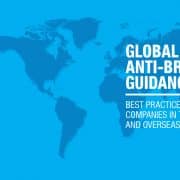|
Getting your Trinity Audio player ready...
|
The third anti-bribery and corruption (ABC) survey from law firm ENSafrica is out – this year 132 organisations, including ENS corporate clients, across Africa participated. This, said the firm, represents a 50% increase in participation from 2015 and indicates a greater interest in and awareness of the importance of ABC.
Of the 132 respondents, 83% indicated that they conducted business in Africa, but a significant number indicated that their companies conducted business in the US (26%) and the UK (26%). The physical location of individual respondents is important as this may have had a bearing on their perceptions. In this regard, the majority of respondents indicated that they were located in South Africa, with the remainder based in Burundi, Ghana, Mauritius, Namibia, Nigeria, Rwanda and Uganda.
Respondents came from a range of industries, but in large part were from financial services (25%) and manufacturing, retail and wholesale (24%). There was also significant representation from the oil, gas and energy; consulting; telecommunications; mining; transportation; IT and electronics; and tourism sectors.
More companies experiencing incidents of bribery
In 2016 ENSafrica found that 39% of respondents have experienced incidents of bribery or corruption in the last 24 months. This is a significant increase over last year’s 24%. Of the 39%, 18% experienced three or more incidents and 20% experienced five or more incidents within the last two years.
The majority of these incidents (79%) took place in South Africa, making it one of the hotspots on the continent for corruption. However, says ENSafrica, this result could be influenced by the fact that 80% of the respondents were located here. Incidents were also reported to have occurred in Mozambique, Kenya, Namibia, Ghana, Tanzania, the Democratic Republic of Congo and Uganda.
“A lot of the corruption that happens is because government officials solicit bribes and they receive bribes,” says ENSafrica’s forensics director Steven Powell. “Government departments, both at the local and national level, need to enhance their commitment to implementing anti-corruption programmes.”
Powell also says that government departments must be more careful when it came to their business partners. “A lot of these contracts from government are given to people that don’t have the competence, they don’t have the expertise and they get the contracts through corruption, through bribes, and it ends with poor service delivery.”
Government should do thorough checks on the companies that are awarded contracts, so that only those who are clean and who can deliver get the work, he says.
Compliance still not adequate
The key question addressed in the survey was whether or not companies are putting proportionate measures in place to deal with the rising risks of bribery and corruption. The answer seems to be yes, and no.
Ninety-two percent of respondents believed that their companies demonstrated a culture of compliance and 90% indicated that their companies had established a policy prohibiting bribes, while 70% said that their company was running an ABC compliance programme. While it may appear that companies are committed to combating the risks of bribery and corruption, says ENSafrica, these findings were undermined by the absence of certain key ABC measures.
For example, the 90% of companies with an ABC policy far exceeds the 70% who have an ABC programme. And only 53% of respondents indicated that their companies had conducted an ABC risk assessment or gap analysis, which in itself is a compliance obligation that is not diligently applied. A further 15% indicated that such risk assessments were in the pipeline. Of the 53% who indicated that risk assessments had been done, 65% indicated that the ABC compliance programmes in place had been tailored based on the results of the risk assessments.
The main reasons cited for not having an ABC programme were “no internal expertise to conduct or implement programme” (43%) and “we are in the process of developing one” (43%).
While it is positive that a large number of companies have implemented documented ABC policies, says ENSafrica, a regulator may view the absence of further measures as indicative of superficial commitment to ABC and may view the implementation of an ABC policy without a proper ABC compliance programme as being a window-dressing exercise that will not hold up under scrutiny. This could, in turn, expose companies and senior management to significant legal liability.
The survey further found that very few corporates had invested in compliance programmes, with compliance viewed as a grudge spend.
Other concerning findings included the following:
- 15% of respondents indicated that their companies did not conduct due diligence on merger and acquisition transactions.
- 28% of respondents said that due diligence screening was not done on new employees.
- 34% of respondents indicated that they did not believe sufficient resources and funding were dedicated to the compliance function.
- 35% of respondents indicated that no due diligence screening was done on third parties.
- 44% of respondents said that there was no dedicated ABC training at their companies.
- 79% of respondents indicated that their companies did not provide ABC training to third parties, despite the fact that 76% of respondents indicated that the most significant ABC risk faced by their companies was the use of third parties.
For some corporates operating in Africa, there may be a prevailing view that compliance with ABC laws is simply too costly and that business cannot be effectively conducted if stringent controls were to be put in place and enforced.
But corporates that believe they can escape the jurisdiction of foreign regulators should be cautious as ultimately there is a global wave of change towards zero tolerance to non-compliance. When it comes to corrupt activities, prevention is better than cure and ABC compliance should be non-negotiable for all corporates operating in Africa.








